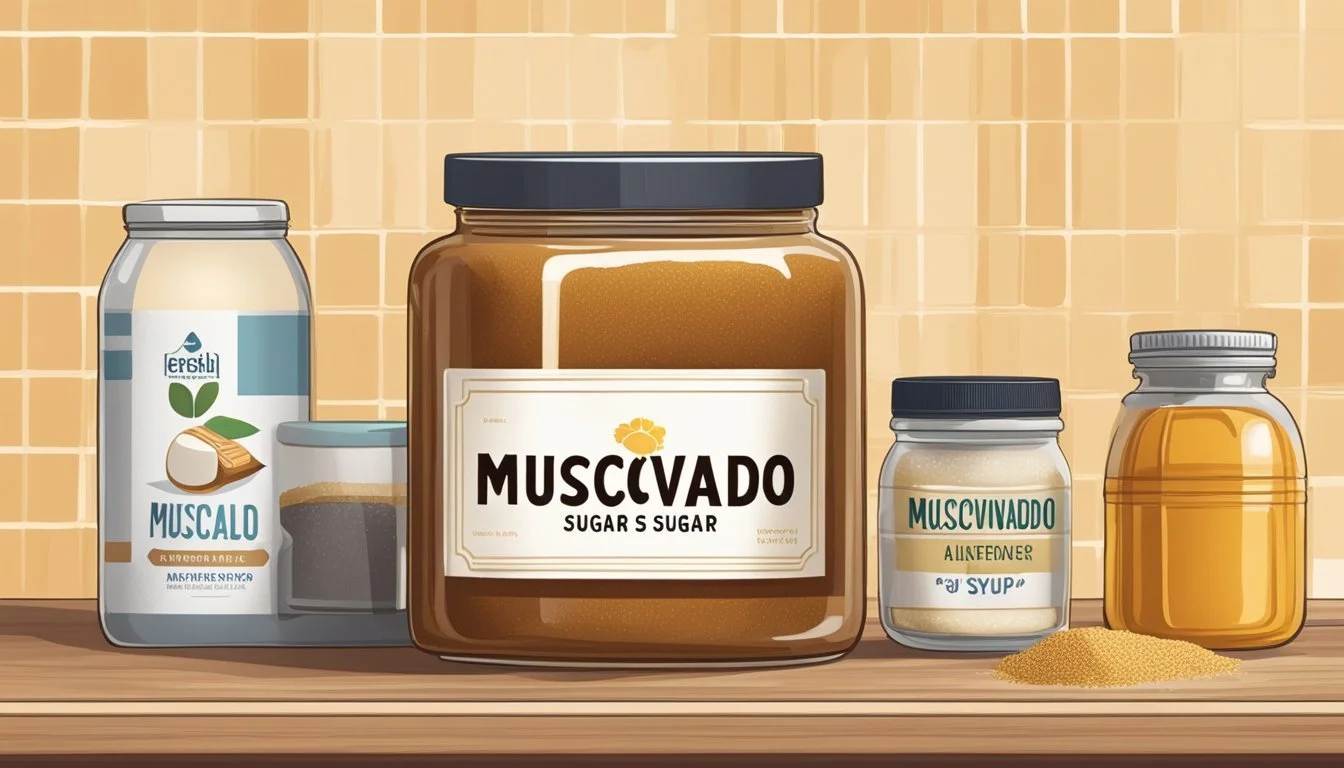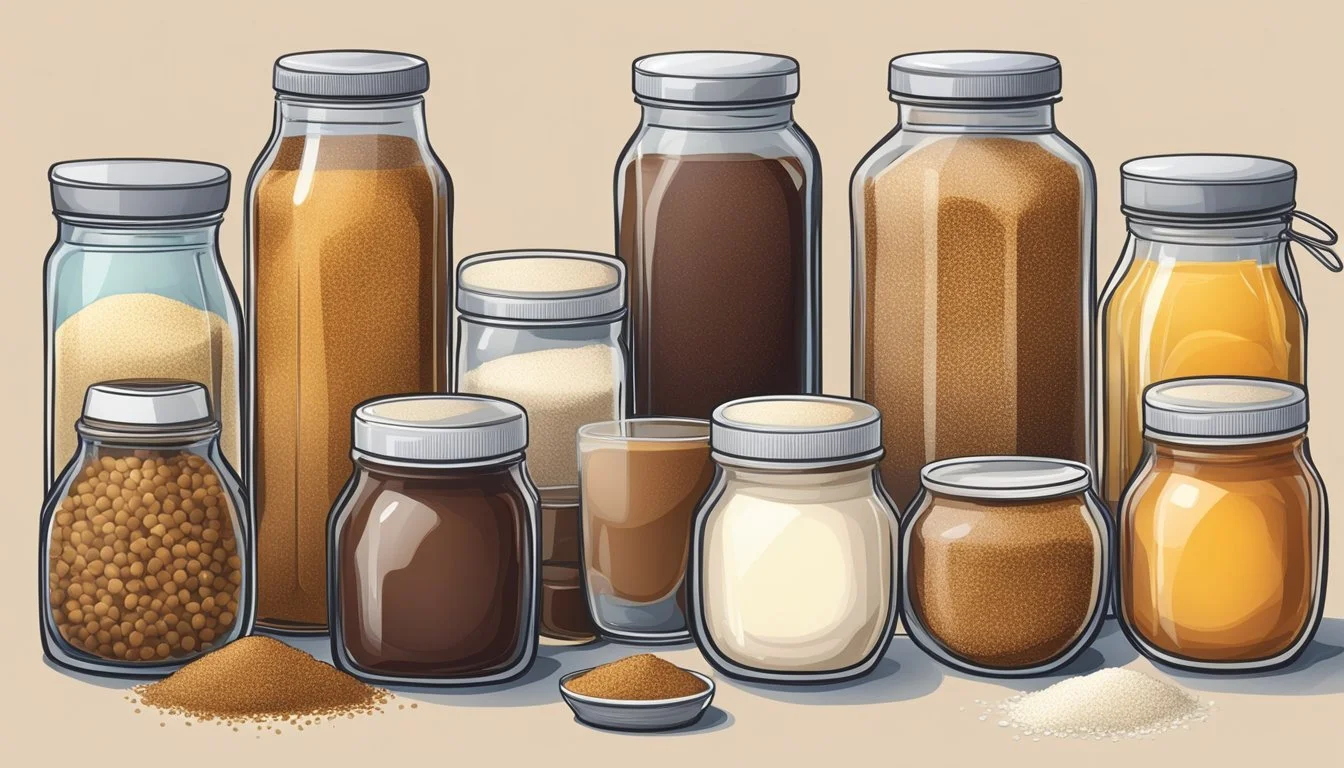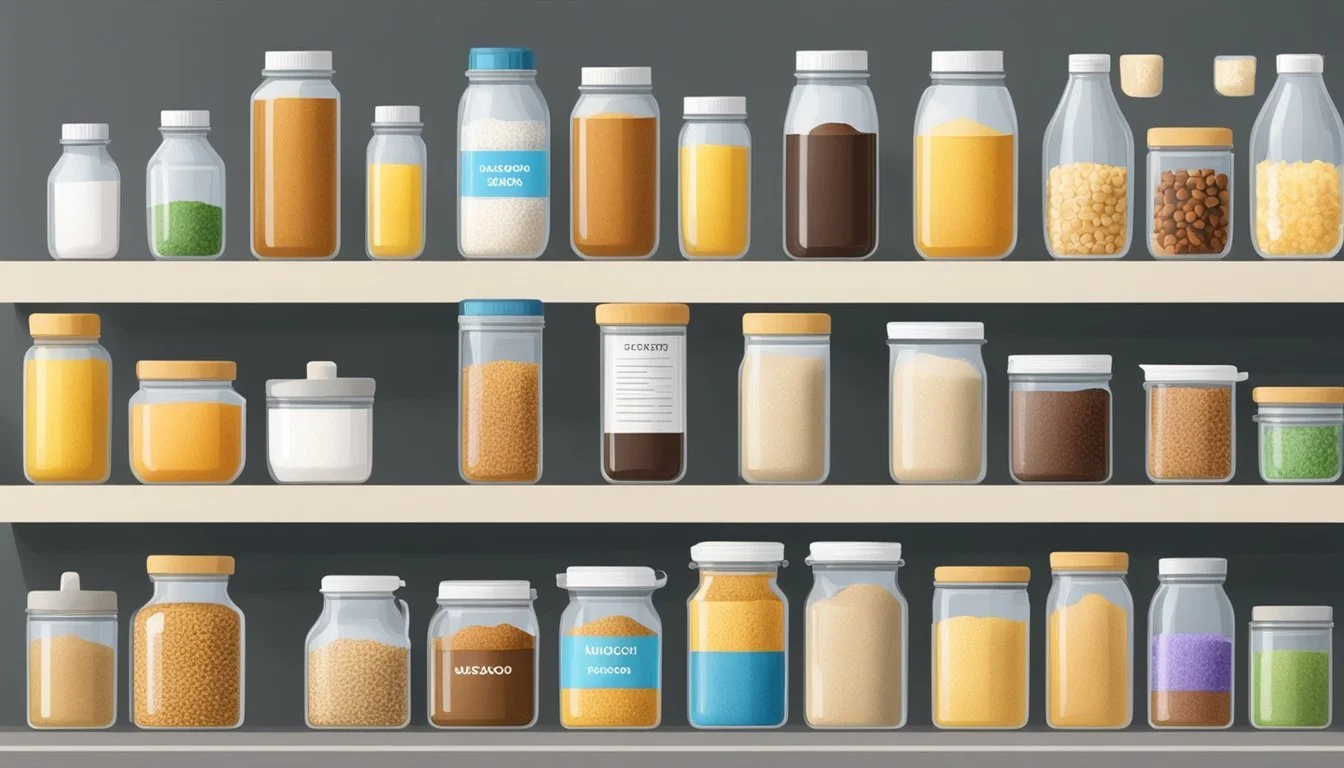Muscovado Sugar Substitutes
Best Alternatives for Cooking and Baking
For those who love baking and cooking, muscovado sugar is a pantry staple prized for its rich, molasses-like flavor. Sometimes, though, you may find yourself out of this unrefined brown sugar right when you need it most. The best substitutes for muscovado sugar are brown sugar, demerara sugar, and jaggery. These alternatives can closely mimic its deep, complex taste and consistency in recipes.
Brown sugar and demerara (or turbinado) sugar, in particular, offer similar caramel and molasses notes, making them excellent replacements. If these options are unavailable, other substitutes like molasses combined with white granulated sugar can also create a comparable flavor profile. These substitutions ensure your dishes maintain the desired sweetness and texture.
Exploring these substitutes allows you to seamlessly switch ingredients without sacrificing taste. Understanding the characteristics of each alternative can elevate your culinary creations, making you a more versatile and resourceful cook.
Understanding Muscovado Sugar
Muscovado sugar, a type of unrefined cane sugar, is distinguished by its high molasses content, moist texture, and complex flavor.
Origin and Production
Muscovado sugar is derived from sugar cane. It is primarily produced in countries like India, the Philippines, and Colombia.
Unlike refined sugars, muscovado undergoes minimal processing. The sugar cane juice is extracted and then boiled down to form a thick syrup. This syrup is then cooled and allowed to crystallize, retaining the natural molasses.
The resulting product is a deep brown sugar with a soft, sticky texture. The traditional methods used in its production are often considered artisanal, contributing to its unique qualities.
Characteristics and Uses
Muscovado sugar is known for its dark color and rich, complex flavor. The high molasses content gives it a distinct taste, reminiscent of toffee or caramel.
It has a moist texture, which can enhance the moisture content in baked goods. Muscovado is often used in recipes like gingerbread, brownies, and barbecue sauces.
Its bold flavor can also complement savory dishes, making it a versatile ingredient. Whether in sweets or savory dishes, muscovado adds a depth of flavor that other sugars might lack.
Muscovado Sugar in Baking
Muscovado sugar, an unrefined sugar, offers a unique depth of flavor and moisture that can transform baked goods. Its rich molasses content enhances both texture and taste, making it a favorite among bakers.
Role in Texture and Flavor
Muscovado sugar imparts a bold molasses flavor to recipes, making it ideal for items that benefit from a deep, caramel-like taste. Its high molasses content also means that it retains more moisture compared to regular brown sugar, resulting in baked goods that are softer and more moist.
For example, cookies made with muscovado sugar are chewier, while cakes gain a richer, more intense flavor. It's especially effective in recipes like gingerbread, where the spices are complemented by the strong molasses undertones. Muscovado sugar's large granules provide a slight crunch, adding to textural variety in baked treats.
Common Baked Goods with Muscovado
Muscovado sugar is a go-to ingredient for a variety of baked goods. It enhances the complexity of chocolate baked goods, making brownies and chocolate cakes taste deeper and more robust. Its rich flavor profile is indispensable in gingerbread, where it pairs well with the spicy warmth of ginger and cinnamon.
Cookies, especially those like molasses or spice cookies, benefit significantly from muscovado sugar. The moisture and flavor it provides can elevate a simple cookie to an indulgent treat. Another popular use is in caramel and toffee recipes, where its pronounced caramel flavor adds depth and richness.
Identifying Substitutes
When looking for muscovado sugar substitutes, it is essential to understand both the criteria for suitable replacements and the various options available. These substitutes can vary depending on the recipe requirements and the desired flavor profile.
Criteria for Suitable Substitutes
To find a suitable substitute for muscovado sugar, there are several key factors to consider:
Flavor Profile: Muscovado sugar has a rich, molasses-like taste. A good substitute should replicate this depth of flavor.
Moisture Content: Muscovado sugar is moist and sticky, so a substitute should maintain a similar texture to ensure the recipe’s integrity.
Color: The dark brown color of muscovado sugar can influence the final look of the dish. Opt for substitutes with similar hues for visual consistency.
Popular Muscovado Substitutes
Here are some widely recommended substitutes for muscovado sugar:
1. Brown Sugar:
Brown sugar, both light and dark, is a common replacement. Dark brown sugar is the best substitute for muscovado sugar due to its higher molasses content. It provides a similar color and moisture level, making it ideal for baking.
2. White Granulated Sugar + Molasses:
Combining white granulated sugar with molasses can mimic muscovado sugar. Use around one cup of granulated sugar with two tablespoons of molasses. This mixture replicates the rich, complex flavor and sticky texture.
3. Demerara Sugar:
Demerara sugar, crystallized from sugarcane, offers a crunchy texture and a light brown color. Its toffee-like flavor makes it a suitable substitute, especially in baking cookies and crumbles.
Substitutes for Specialty Applications
Different recipe types may necessitate specific substitutes:
1. Jaggery:
This unrefined sugar, often used in South Asian cuisine, is a solid alternative for dishes requiring a similar complexity and moisture. It works well in sauces and marinades.
2. Turbinado Sugar:
Turbinado, or raw sugar, retains some molasses, giving it a mild but distinct flavor. This makes it appropriate for beverages and sprinkling over baked goods.
3. Molasses:
When more intense flavor is needed, plain molasses can serve as a substitute. Use sparingly, as it is much stronger than muscovado sugar. It’s best for adding depth to sauces and stews.
Using the right substitute ensures that the finished dish retains the desired flavor, texture, and appearance. Experiment with these alternatives to find the best one for your specific needs.
Types of Sugar as Muscovado Substitutes
When looking for a substitute for muscovado sugar, various options provide similar levels of sweetness and flavor complexity. These alternatives span across brown sugars, white sugars, unrefined sugars, and liquid sweeteners.
Brown Sugars
Brown sugar and demerara sugar are notable substitutes. Brown sugar, a mixture of white sugar and molasses, can mirror the rich, moist texture of muscovado. Use it in an equal 1:1 substitution ratio.
Demerara sugar has large, golden toffee-colored crystals and a pronounced molasses flavor. It works well in recipes requiring a robust caramel-like sweetness. Turbinado sugar shares similarities with demerara but is slightly more refined, imparting a milder flavor.
White Sugars
When substituting white sugars, combining white granulated sugar with molasses can replicate muscovado's taste and texture. Mix 1 cup of granulated sugar with 1-2 tablespoons of molasses for an effective alternative.
This method maintains the smooth texture and sweetness while reintroducing the molasses component found in muscovado. Granulated sugar alone lacks the depth of flavor but can be a last resort.
Unrefined Sugars
Jaggery and panela are standout unrefined sugar substitutes. Jaggery, often formed into cakes or cones, boasts a rich, deep flavor due to its high molasses content. Use it in the same quantity as muscovado for an authentic substitute.
Panela shares a similar unrefined nature and molasses-heavy profile, providing a direct flavor match. Other unrefined sugars like rapadura also serve as suitable substitutes, offering the same complex notes and natural sweetness.
Liquid Sweeteners
Honey and maple syrup present liquid alternatives to muscovado sugar. Honey complements many recipes with its floral and slightly acidic undertones. Substituting it involves slight recipe modifications to account for its liquid form.
Maple syrup provides a caramel-like sweetness but is thinner than muscovado. For each cup of muscovado, use 3/4 cup of maple syrup and reduce other liquids in the recipe by 3 tablespoons. This ensures a balanced texture without compromising sweetness or flavor.
Considerations for Substitution
When substituting muscovado sugar, it is crucial to understand the impact on flavor, moisture, and texture, as well as the proper sugar conversion ratios. These factors ensure that the final product remains as close as possible to the original recipe's intent.
Flavor Impact
Muscovado sugar's unique, rich flavor comes from its higher molasses content. This imparts a deep toffee-like flavor, similar to caramel and honey. Substitutes like brown sugar and Demerara share a similar flavor profile, but with less intensity.
Brown Sugar vs. Muscovado:
Brown Sugar: Sweeter, lighter flavor.
Muscovado: Richer, toffee-like undertones.
Using brown sugar with a touch of molasses can enhance the depth of flavor, approaching the taste of muscovado more closely.
Moisture and Texture
One key characteristic of muscovado sugar is its moist texture, which affects the final texture of baked goods. When substituting, it's important to choose sugars that replicate this quality as closely as possible.
Comparing Textures:
Muscovado: Sticky, moist.
Demerara: Slightly less moist, larger crystals.
Brown Sugar: Moderately moist.
Adding a small amount of molasses to substitutes like brown sugar can help achieve similar moistness and texture, preventing baked goods from becoming too dry.
Sugar Conversion Ratios
Proper conversion ratios are crucial when substituting sugars to maintain the desired sweetness level and consistency. The following conversion ratios can help maintain the recipe's balance:
Conversion Tips:
Brown Sugar: Substitute 1 cup of muscovado with 1 cup of brown sugar.
Brown Sugar + Molasses: Mix 1 cup of brown sugar with 1 tablespoon of molasses for a closer flavor and texture match.
Demerara/Turbinado: Use equal amounts as muscovado but be mindful of slight texture differences.
Adhering to these ratios ensures that substitutes align closely with the original muscovado sugar in both flavor and function.
Using Muscovado Substitutes in Recipes
Muscovado sugar substitutes can seamlessly integrate into various culinary applications, ensuring you achieve the desired flavor and texture in your dishes. Depending on the recipe, certain substitutes may work better than others to replicate muscovado's unique taste.
Baking and Desserts
In cakes, cookies, and other baked goods, brown sugar serves as an effective muscovado substitute due to its similar moisture content and flavor profile. For a closer match, mix one cup of brown sugar with a tablespoon of molasses.
Barbados or Demerara sugar can also be used, providing a rich caramel flavor and slightly coarse texture. These sugars enhance recipes like chocolate chip cookies or gingerbread, contributing an extra depth of taste. When substituting in delicate pastries, opt for a finer sugar blend to maintain texture without altering the outcome.
For brownies or dense cakes, combining brown sugar with honey or maple syrup can replicate muscovado’s moisture and flavor, giving your dessert a soft and chewy texture.
Savory Cooking and Marinades
Muscovado sugar plays a pivotal role in savory dishes and marinades, lending a deep molasses flavor that complements meats and sauces. Jaggery, with its similar unrefined nature, is a good substitute in barbecue sauces and marinades, providing a robust sweetness.
Brown sugar combined with molasses can also work well in savory recipes, balancing flavors in marinades for meats and barbecue sauces. An additional benefit is its excellent ability to caramelize, creating a glossy finish on dishes like glazed ribs or pork belly.
In marinades, consider using dark brown sugar for a milder version, allowing for versatility in different dishes without overpowering the other ingredients.
Beverages and Sweeteners
Tea, coffee, and other beverages benefit greatly from muscovado’s intense sweetness. Date sugar or coconut sugar can mimic its thick, rich taste in hot drinks.
For those preferring a liquid sweetener, combining brown sugar with maple syrup can achieve a similar flavor when stirred into teas or coffees. This mix not only sweetens but also enhances the beverage's aroma.
In refreshing drinks like lemonade or iced tea, honey paired with brown sugar can substitute muscovado sugar, bringing a balanced sweetness that heightens the natural flavors of the beverage.
By choosing the right substitute, you can maintain the integrity and balance of your recipes while enjoying the unique taste that muscovado sugar imparts.
Where to Find Substitutes
Finding muscovado sugar substitutes is manageable both in physical retail settings and online stores. Options like brown sugar, demerara sugar, and molasses are common and accessible from various sources.
Physical Stores
Many supermarkets and grocery stores carry common muscovado sugar substitutes. They are typically found in the baking aisle.
For those needing specialty items like jaggery or turbinado sugar, a visit to a health food store or specialty market is often necessary. Stores focused on organic or health-conscious products often have a wider range of alternatives.
Additionally, some substitutes can be located in international food markets. Markets that focus on South Asian, Caribbean, or Latin American cuisines are good places to find jaggery and other less common substitutes.
Online Purchase Options
Purchasing muscovado sugar substitutes online provides convenience. Retailers like Amazon, Walmart, and Target offer an extensive range of alternatives, often with customer reviews and ratings for quality assurance.
Specialty online stores, such as Thrive Market or iHerb, may provide organic or non-GMO versions.
For hard-to-find items like certain types of jaggery, niche online vendors may be the go-to source. Subscription services or bulk purchase options can also be economical for regular baking needs.
Storage and Shelf Life
Proper storage ensures muscovado sugar maintains its quality and flavor over time. Keeping it in the right conditions can significantly extend its shelf life.
Preserving Quality Over Time
To maintain the rich flavor and texture of muscovado sugar, it is essential to store it correctly. The sugar's high molasses content and moisture make it more prone to hardening and clumping if exposed to air.
Store muscovado sugar in an airtight container to prevent moisture loss and contamination. Place the container in a cool, dry location, away from direct sunlight and heat sources.
If the sugar hardens, it can be softened by placing a damp cloth or a slice of bread inside the container for a few hours. This will help restore some of the moisture.
Best Practices for Storage
Muscovado sugar should be stored in a dark pantry or cupboard. Avoid places with fluctuating temperatures, such as near ovens or windows.
Airtight containers made of glass or plastic with tight seals are ideal for storage. These containers protect against pests and air exposure that can degrade the sugar's quality.
Label the container with the date of purchase. While muscovado sugar can last a long time if stored properly, it's good practice to use older supplies first to ensure freshness.
Concluding Thoughts
Bakers and chefs often find themselves looking for substitutes for muscovado sugar, especially when it's not readily available. Several options can effectively replace muscovado sugar in recipes while maintaining the desired flavor and texture.
Brown sugar stands out as a popular choice. A simple 1:1 substitution works well due to its similar molasses content.
Demerara sugar or Turbinado sugar are also excellent alternatives. Their rich, dark flavors, along with notes of caramel and molasses, make them suitable for various baked goods.
Another option is to combine brown sugar with molasses. Mixing one cup of brown sugar with one tablespoon of molasses can closely replicate the depth of muscovado sugar.
Sucanat and palm sugar serve as viable substitutes. They offer distinct yet complementary flavors that work in many recipes. Jaggery and molasses are additional choices, though their unique characteristics can slightly alter the final product's taste and consistency.
Using these substitutes allows for flexibility in the kitchen without compromising quality. Each substitute brings its unique profile, providing a versatile range of flavors for different culinary creations.








